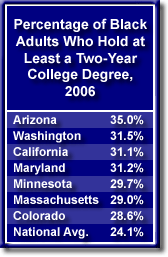Harvard Regains the Top Position in Black Student Yield
 So-called yield, the percentage of applicants who decide to go to a college that issues an invitation to them, has become the standard measure of an institution’s strength and drawing power. So-called yield, the percentage of applicants who decide to go to a college that issues an invitation to them, has become the standard measure of an institution’s strength and drawing power.
For most of the past 20 years Harvard University has been the nation’s gold standard in student yield percentage for both black and white students. But in both 2002 and 2003 the top performance in black student yield moved to Stanford University. In 2003 the black student yield at Stanford was 67.9 percent, the highest in the country. Yet, in 2005 and 2006 Harvard University once again posted the highest black student yield. A year ago, in 2007, MIT ranked first in black student yield.
Among the nation’s highest-ranked universities in the United States, this year Harvard posted the highest black student yield at 64.1 percent. MIT came in a close second with a black student yield of 63.9 percent.
Stanford University ranked third this year with a black student yield of 60.4 percent. This improved from 54 percent a year ago. The University of Pennsylvania and UCLA also posted black student yields above 50 percent in 2008.

UNIVERSITY OF NORTH CAROLINA WILMINGTON

Irwin Belk Distinguished Professor
of Nursing Education Technology
The University of North Carolina Wilmington (UNCW) School of Nursing (SON) seeks applications for the Irwin Belk Distinguished Professor of Nursing Education Technology. The successful candidate will provide leadership in designing, implementing, and evaluating nursing education models that employ informatics, telehealth, patient simulation, and/or distance learning in teaching, research, and public service.
Minimum qualifications include: graduate degree in nursing; earned doctorate in nursing or related discipline; five years experience in higher education; demonstrated program of research and scholarly publications related to education models using technology in nursing education. A current unrestricted license as a registered nurse in North Carolina is required by the hiring date. Academic credentials suitable for an appointment at the level of a full professor with tenure are required.
Further information about UNCW and the SON can be found at http://www.uncw.edu/facts and http://www.uncw.edu/son. Priority consideration will be given to applications received by January 30, 2009 but applications will be received until the position is filled. For more information and to apply, please visit the Web at http://consensus.uncw.edu. EEO/AA Employer.

Southern University Receives a Unique Donation
 The Shreveport campus of historically black Southern University received a unique donation from FedEx. The shipping firm donated a Boeing 727 jetliner for use in the university’s aerospace technology degree program. The plane has been delivering FedEx packages for 15 years after serving 13 years in the Air Canada fleet. The grounded plane will now be used as a workshop for the university’s aerospace program, which is based at Shreveport’s Downtown Airport. The Shreveport campus of historically black Southern University received a unique donation from FedEx. The shipping firm donated a Boeing 727 jetliner for use in the university’s aerospace technology degree program. The plane has been delivering FedEx packages for 15 years after serving 13 years in the Air Canada fleet. The grounded plane will now be used as a workshop for the university’s aerospace program, which is based at Shreveport’s Downtown Airport.
The jet is 153 feet long and weighs more than 200,000 pounds.
Ohio University Forms an Alliance With Eight HBCUs
 Ohio University and eight historically black colleges and universities have formed what is called the Interlink Alliance. Members of the alliance have pledged to work cooperatively in three key areas: faculty development, student leadership, and an African-American male initiative that engages and motivates prospective college students as early as middle school. Ohio University and eight historically black colleges and universities have formed what is called the Interlink Alliance. Members of the alliance have pledged to work cooperatively in three key areas: faculty development, student leadership, and an African-American male initiative that engages and motivates prospective college students as early as middle school.
For example, the members of the alliance will share ideas on the best strategies to steer more African Americans to careers in the academic world and how best to recruit and retain black male students. The alliance was the brainchild of Ohio University president Roderick J. McDavis. Tyrone M. Carr, associate director of organizational development at Ohio University, will serve as director of the alliance.
 Blacks make up 5 percent of the nearly 18,000 undergraduates at Ohio University’s main campus in Athens. Blacks make up 5 percent of the nearly 18,000 undergraduates at Ohio University’s main campus in Athens.
The eight HBCUs involved in the alliance are Central State University, Spelman College, Wilberforce University, Johnson C. Smith University, North Carolina Central University, Hampton University, South Carolina State University, and Virginia State University.
Open Enrollment Ends at Texas Southern University, But the Number of New Freshmen Is on the Rise
 In the past any student with a high school diploma or a GED certificate could gain admission to Texas Southern University, the historically black educational institution in Houston. This open admissions policy was a key factor in Texas Southern’s dismally low graduation rate of 11 percent. Officials at the university report that many students who were not qualified for college-level work apparently enrolled at Texas Southern under open admissions and with benefit of federal financial assistance, but they did little or no work toward a degree. In the past any student with a high school diploma or a GED certificate could gain admission to Texas Southern University, the historically black educational institution in Houston. This open admissions policy was a key factor in Texas Southern’s dismally low graduation rate of 11 percent. Officials at the university report that many students who were not qualified for college-level work apparently enrolled at Texas Southern under open admissions and with benefit of federal financial assistance, but they did little or no work toward a degree.
 New president John M. Rudley ended open admissions this fall. Now applicants must be in the top 25 percent of their high school class or have maintained a 2.0 grade point average while in high school. Students not meeting these criteria could still enroll if they successfully complete a summer preparatory program. New president John M. Rudley ended open admissions this fall. Now applicants must be in the top 25 percent of their high school class or have maintained a 2.0 grade point average while in high school. Students not meeting these criteria could still enroll if they successfully complete a summer preparatory program.
To the surprise of many observers, the end of open admissions resulted in an increase in freshman enrollments this fall. There are 1,347 freshman students this year, up 6.4 percent from a year ago.
College Students in Vermont Obtain Recognition for a Black Slave Who Fought in the Revolutionary War
Students at Green Mountain College in Poultney, Vermont, successfully lobbied for the erection of a historical marker in the town square honoring Jeffrey Brace, the town’s first black resident.
Brace was born in West Africa in 1742. He was enslaved at age 16 and transported to the Caribbean island of Barbados. As a slave he fought for the British in the French and Indian War. After the war he was sold to a slave master in Connecticut. When his master died, his widow taught Brace to read, write, and speak proper English.
 At the onset of the Revolutionary War, Brace, with the approval of his owner, enlisted in the Continental Army. He was wounded in battle. At the end of the war Brace was granted his freedom. At the onset of the Revolutionary War, Brace, with the approval of his owner, enlisted in the Continental Army. He was wounded in battle. At the end of the war Brace was granted his freedom.
The former slave then moved to Poultney, Vermont, where he bought land and became a farmer. Brace became blind in his old age. But in 1810 he told his story to Benjamin F. Prentiss who published the memoir as The Blind African Slave.
The book was forgotten until it was discovered more than a decade ago in the special collections unit of the University of Vermont library by Kari J. Winter, associate professor of American studies at the University of Buffalo. Over an eight-year period, Dr. Winter verified the memoir and found Brace’s descendants. In 2004 she republished the memoir with a new introduction which includes her documentation verifying its authenticity.

NORTH CAROLINA STATE UNIVERSITY

Associate Dean for Research and Extension,
College of Natural Resources
The College of Natural Resources at North Carolina State University invites applications and nominations for its position of Associate Dean for Research and Extension.
The Associate Dean is expected to provide dynamic leadership in achieving CNR’s goal of excellence in research and extension scholarship and to foster innovative ideas for enhancing research and extension scholarship opportunities. The successful candidate will oversee the CNR Research Office, including pre- and post-award administration. He/She will build and maintain successful relationships with a variety of external stakeholders and provides leadership on a variety of college-wide initiatives. The successful candidate is also expected to foster a climate supportive of innovative collaboration among CNR faculty and its external partners. He/She represents the college on research and extension matters in university, state, national and international venues and assists the Dean on other matters. We are looking for an energetic and skilled individual who can provide direction in growing and enhancing the reputation of the college’s research and extension programs.
Screening of applications will begin January 9, 2009 and applications will continue to be accepted until the position is filled. All applications must be submitted online at http://jobs.ncsu.edu (position #05-64-0804). On the site you will be asked to complete an EPA profile and attach a current curriculum vitae, a cover letter describing your interest in the position and the names and contact information for at least four references.
For more information, please see http://cnr.ncsu.edu/associatedeanposting.htm. Inquiries should be directed to Barry Goldfarb (Chair, Search and Screen Committee) at (919) 515-4471 or barry_goldfarb@ncsu.edu, Dept. Of Forestry and Environmental Resources, Campus Box 8008, NC State University, Raleigh, NC 27695-8008.
NC State University is an equal opportunity/affirmative action employer.

Blacks Have Huge Underrepresentation at New York City’s Elite Public High Schools
 New York City operates eight elite high schools where admission is based on the results of a two and a half hour qualifying examination. In 2007, 21,490 students took the qualifying examination and 20 percent of all test takers were offered a position at one of the elite high schools. Students who achieve academic success at these elite high schools are on track for admission to the nation’s most selective colleges and universities. New York City operates eight elite high schools where admission is based on the results of a two and a half hour qualifying examination. In 2007, 21,490 students took the qualifying examination and 20 percent of all test takers were offered a position at one of the elite high schools. Students who achieve academic success at these elite high schools are on track for admission to the nation’s most selective colleges and universities.
But the results showed that only 6 percent of black students who took the examination were offered a place at one of the eight high schools. In contrast, 35 percent of Asian-American students and 31 percent of white students who took the exam were offered a spot at an elite high school. Blacks make up 32 percent of all public school students in the city.
At the city’s most elite high schools, the racial disparities are even greater. At Stuyvesant High School in lower Manhattan, which specializes in mathematics, science, and technology, only 2 percent of black applicants were accepted compared to 72 percent of Asian-American applicants. At the Bronx High School of Science, blacks are only 4 percent of the 2,800-member student body.
In Memoriam
Walter L. Walker (1935-2008)
 Walter L. Walker, the former president of LeMoyne-Owen College in Memphis, has died at the age of 73. He had suffered from multiple sclerosis for more than 30 years. Walter L. Walker, the former president of LeMoyne-Owen College in Memphis, has died at the age of 73. He had suffered from multiple sclerosis for more than 30 years.
Dr. Walker was a graduate of the University of Chicago. He earned his master’s degree at the Bryn Mawr School of Social Work and a Ph.D. at Brandeis University.
After serving in the Air Force he joined the faculty at the University of Chicago and later became vice president for planning at the university. In 1974 he was named president of LeMoyne-Owen College. He served in that position for 12 years. He later was an assistant to the vice chancellor at the University of Tennessee.
Honors and Awards
 • Desmond Tutu, archbishop emeritus of Cape Town in the Anglican Church of Southern Africa, has been presented with the Wallenberg Medal by the University of Michigan. The award is named after Raoul Wallenberg, the Swedish diplomat who saved the lives of thousands of Hungarian Jews in World War II. Wallenberg graduated from the University of Michigan College of Architecture in 1935. • Desmond Tutu, archbishop emeritus of Cape Town in the Anglican Church of Southern Africa, has been presented with the Wallenberg Medal by the University of Michigan. The award is named after Raoul Wallenberg, the Swedish diplomat who saved the lives of thousands of Hungarian Jews in World War II. Wallenberg graduated from the University of Michigan College of Architecture in 1935.
 • Willie Williams, the assistant director of textbook operations at Wake Forest University, was named the university’s Employee of the Year. Williams has been at Wake Forest since 1997. • Willie Williams, the assistant director of textbook operations at Wake Forest University, was named the university’s Employee of the Year. Williams has been at Wake Forest since 1997.
 • K. Anthony Appiah, Laurance S. Rockefeller University Professor of Philosophy, has been awarded the Joseph B. and Toby Gittler Prize from Brandeis University. The award recognizes outstanding and lasting contributions to racial, ethnic, and religious relations. • K. Anthony Appiah, Laurance S. Rockefeller University Professor of Philosophy, has been awarded the Joseph B. and Toby Gittler Prize from Brandeis University. The award recognizes outstanding and lasting contributions to racial, ethnic, and religious relations.
 • Vernon G. Smith, an Indiana state representative and professor of education at Indiana University Northwest in Gary, received the W. George Pinnell Award for Outstanding Service from Indiana University. • Vernon G. Smith, an Indiana state representative and professor of education at Indiana University Northwest in Gary, received the W. George Pinnell Award for Outstanding Service from Indiana University.
Grants
• The University of Florida College of Dentistry received a five-year, $5.3 million grant from the National Institutes of Health. The grant will fund a new research center aimed at reducing racial disparities in head and neck cancer survival rates among low-income men.
• Fort Valley State University, the historically black educational institution in Georgia, received a two-year, $946,918 grant from the U.S. Department of Education. The grant will be used to upgrade the infrastructure of the university’s Hunt Memorial Library and to increase collections of books, microfilm, periodicals, and other educational materials.
• Fisk University, the historically black educational institution in Nashville, Tennessee, received a two-year, $500,000 grant from the Carnegie Corporation of New York. The grant will be used to support faculty and institutional development.
|

The Growing Gender Gap at Black Colleges and Universities
The latest data from the U.S. Department of Education shows total enrollments of 248,800 African Americans at the nation’s historically black colleges and universities. Of this total, black women account for 62.2 percent of all African-American enrollments. A decade ago, black women accounted for 60.2 percent of all African-American enrollments at the nation’s historically black colleges and universities.
  |
“Brothers should pull up their pants. You are walking by your mother, your grandmother. Your underwear is showing. What’s wrong with that? Come on. Some people might not want to see your underwear. I’m one of them.”
— President-elect Barack Obama in an interview on MTV
|
Preservationists Seek to Stop Georgia Tech From Razing a Landmark of the Civil Rights Movement
 On the day after President Lyndon Johnson signed the Civil Rights Act of 1964, which banned racial discrimination in public accommodations including restaurants and hotels, Lester Maddox chased three black college students from his Pickrick restaurant in Atlanta. Maddox wielded a .38 caliber revolver and a pick ax. There was widespread publicity in the national press. African Americans set up pickets to protest Maddox’s refusal to admit blacks to the Pickrick restaurant. As a result, he became a national poster boy for racial segregation. Maddox closed the restaurant rather than comply with the nation’s new civil rights law. Georgia Tech bought the property. A year later in 1966, Maddox used his newfound celebrity to launch a successful campaign for the governorship of Georgia. Maddox died in 2003. On the day after President Lyndon Johnson signed the Civil Rights Act of 1964, which banned racial discrimination in public accommodations including restaurants and hotels, Lester Maddox chased three black college students from his Pickrick restaurant in Atlanta. Maddox wielded a .38 caliber revolver and a pick ax. There was widespread publicity in the national press. African Americans set up pickets to protest Maddox’s refusal to admit blacks to the Pickrick restaurant. As a result, he became a national poster boy for racial segregation. Maddox closed the restaurant rather than comply with the nation’s new civil rights law. Georgia Tech bought the property. A year later in 1966, Maddox used his newfound celebrity to launch a successful campaign for the governorship of Georgia. Maddox died in 2003.
Now Georgia Tech wants to demolish the building that housed the Pickrick restaurant to make a park. But some historians want to preserve the building because of its historical importance to the civil rights movement. Civil rights landmarks in Atlanta and other cities have become important attractions drawing large numbers of tourists.
The decision will ultimately be made by the Georgia Tech board of regents.
Toni Morrison Society Finds a Home at Bucknell University
 The Toni Morrison Society has found a new home at Bucknell University in Lewisburg, Pennsylvania. The society, a division of the American Literature Association, encourages scholarship on the works of Toni Morrison, the Princeton University professor emeritus and winner of the Nobel Prize in literature. The Toni Morrison Society has found a new home at Bucknell University in Lewisburg, Pennsylvania. The society, a division of the American Literature Association, encourages scholarship on the works of Toni Morrison, the Princeton University professor emeritus and winner of the Nobel Prize in literature.
The society was founded in 1993 by Carolyn Denard, an associate dean at Emory University. Bucknell University will be the society’s first institutional home.
Bucknell University Press will publish the new Toni Morrison Review, the first academic journal dedicated to Morrison’s work. The society will offer two annual prizes, one for short fiction and one for poetry. The winning original works will be published in the Review.
Carmen Gillespie, associate professor of English at Bucknell, is the executive director of the society.

UNIVERSITY OF NORTH CAROLINA WILMINGTON

Field Experience Coordinator,
Watson School of Education
The Watson School of Education at UNCW seeks to hire a 10-month Field Placements Coordinator. This role is responsible for working with Watson School and public school partners to identify appropriate placements for field experiences and internships. The position involves extensive telephone and email communication with public school contacts, faculty and students. Candidates must possess excellent organizational and communication skills (verbal and written), be professional in interactions, able to work independently, and be proficient at handling multiple priorities. In addition, candidates must have a high level of proficiency using technology, particularly Access and Excel, online application and survey tools, and word processing and reporting functions. Master’s degree in education or related field, and background and/or experience with K-12 public schools and programs is required. Current North Carolina teaching licensure desired.
Priority consideration will be given to applications received by December 1, 2008. But, review of applications will continue until the position is filled.
To apply, please complete the online application process available at http://consensus.uncw.edu. A letter of application addressed to Ms. Cindy Wiseman, Chair, a curriculum vitae, and contact information for three professional references should be attached to the online application, not e-mailed, mailed or faxed, as Microsoft Word or ADOBE PDF attachments. For questions regarding the online application process, contact Ms. Nancy Jones at 910-962-3179.
UNCW actively fosters a diverse and inclusive working and learning environment and is an equal opportunity employer. Qualified men and women from all racial, ethnic, or other minority groups are strongly encouraged to apply.

African-American College Students Who Majored in Scientific Fields Earn Less Than Other Minorities Once They Enter the Job Market
 A study conducted by researchers at the National Opinion Research Center at the University of Chicago has found that African-American college students who major in academic fields that generally produce high-paying jobs earn less after they leave college than other minority students who majored in the same fields. The results showed that Asians and Hispanics who majored in science, technology, mathematics, or engineering while in college earned 50 percent more after college than black students who had majored in these fields. A study conducted by researchers at the National Opinion Research Center at the University of Chicago has found that African-American college students who major in academic fields that generally produce high-paying jobs earn less after they leave college than other minority students who majored in the same fields. The results showed that Asians and Hispanics who majored in science, technology, mathematics, or engineering while in college earned 50 percent more after college than black students who had majored in these fields.
The researchers stated that there was some evidence that occupational choices of blacks were a factor in the wage differences. But the authors of the study did not rule out discrimination as a contributing factor.
Educational Attainment of Black Adults by State
 Data from the U.S. Census Bureau’s American Community survey shows that nationwide, 24.1 percent of the adult black population in the United States has obtained a two-year associate’s degree or a higher degree. For whites, 37.7 percent of all adults have at least a two-year college degree. Data from the U.S. Census Bureau’s American Community survey shows that nationwide, 24.1 percent of the adult black population in the United States has obtained a two-year associate’s degree or a higher degree. For whites, 37.7 percent of all adults have at least a two-year college degree.
There are wide disparities in educational attainment rates by state. The Census figures show that in Arizona, California, Washington State, and Maryland, more than 30 percent of black adults hold at least a two-year college degree.
In contrast, in Louisiana, only 15.3 percent of black adults have earned a two-year college degree or a higher degree. Other states where less than 20 percent of the adult black population holds at least a two-year college degree are Arkansas, Indiana, Mississippi, South Carolina, and Wisconsin.
Wilberforce University Forced to Tighten Its Belt
 Wilberforce University, the historically black educational institution in Ohio, is facing a $2.8 million operating shortfall for the current academic year. As a result, interim president Patricia Hardaway has announced that it is eliminating eight administrative positions and reducing salaries for other staff members. Employees will be placed on three nonpaid furloughs during the current academic year at times when students are off from classes. No faculty positions will be eliminated. Wilberforce University, the historically black educational institution in Ohio, is facing a $2.8 million operating shortfall for the current academic year. As a result, interim president Patricia Hardaway has announced that it is eliminating eight administrative positions and reducing salaries for other staff members. Employees will be placed on three nonpaid furloughs during the current academic year at times when students are off from classes. No faculty positions will be eliminated.
The university also plans to reduce its operating budget by eliminating nonessential travel, memberships in professional organizations, and employee use of university cellphones and other communications devices.
President Hardaway said that reduced private giving, endowment earnings, and tuition revenue have all contributed to the budget shortfall.
  |
24.3% Percentage of adult white men in 2007 who regularly smoked cigarettes.
27.6% Percentage of adult black men in 2007 who regularly smoked cigarettes.
source: Centers for Disease Control and Prevention
|
The President-Elect Calls for a Playoff System in Major College Football
 A huge majority of college football fans favor a playoff system to decide a national champion. Two or more teams could finish the season undefeated with the decision on the national champion left to computer rankings and a poll of coaches. But to date, university presidents and athletic directors have been reluctant to change the present bowl system which has provided huge revenues to its participants. A huge majority of college football fans favor a playoff system to decide a national champion. Two or more teams could finish the season undefeated with the decision on the national champion left to computer rankings and a poll of coaches. But to date, university presidents and athletic directors have been reluctant to change the present bowl system which has provided huge revenues to its participants.
But President-elect Barack Obama has twice made a point to advocate a playoff system. In his recent interview on 60 Minutes, Obama stated, “I think any sensible person would say that if you got a bunch of teams and there’s no decisive winner, that we should be creating a playoff system. I don’t know any serious fan of college football that disagrees with me on this. So, I’m going to throw my weight around a little bit. It’s the right thing to do.”
If Obama were successful in establishing a college football playoff, he would gain a great deal of political support from the one group with which he fared the worst in this month’s election — white men.

RUTGERS UNIVERSITY

2009-2010 Postdoctoral Fellowship in Race and Gender Studies
The Center for Race and Ethnicity and Institute for Research on Women at Rutgers University announce a post-doctoral fellowship for scholars pursuing research in race and gender studies. The successful applicant must have the doctorate in hand at the time of application, be no more than six years beyond the Ph.D. and specialize in any discipline. The fellowship of $45,000 is of one year duration and includes benefits and a $2,000 research stipend. The recipient will teach at least one small course and participate in the seminar series at either the Center for Race and Ethnicity or the Institute for Research on Women (whichever is the better fit). For information regarding the Center and Institute see respectively:http://raceethnicity.rutgers.edu/ and http://irw.rutgers.edu.
Please send letter of interest, c.v., dossier with at least three letters of reference and research proposal to Professor Deborah Gray White, Post-Doc Search, Department of History, Rutgers University, 16 Seminary Place, Van Dyck Hall, New Brunswick, NJ 08901. The deadline for applications is January 30, 2009.

Appointments
 • Edgar E. Roulhac, vice provost at Johns Hopkins University in Baltimore, was elected to a three-year term on the Middle States Commission on Higher Education. The commission is an accrediting body for colleges and universities in the Middle Atlantic region. • Edgar E. Roulhac, vice provost at Johns Hopkins University in Baltimore, was elected to a three-year term on the Middle States Commission on Higher Education. The commission is an accrediting body for colleges and universities in the Middle Atlantic region.
• Gregory Roseboro was named director of diversity programs at the University of Georgia School of Law. He had been, and will continue to serve as, the associate director of law school admissions.
Roseboro holds a bachelor’s degree in criminal justice and a law degree from the University of Georgia.
 • DeChanta P. Knox was named special assistant to the president for athletics at Delaware State University. Knox, a graduate of Howard University and former Olympic sprinter, was a consultant for DPK Services in Hockessin, Delaware. • DeChanta P. Knox was named special assistant to the president for athletics at Delaware State University. Knox, a graduate of Howard University and former Olympic sprinter, was a consultant for DPK Services in Hockessin, Delaware.
 • Emmett G. Price III was promoted to associate professor and made chair of the African-American studies department at Northeastern University in Boston. A native of Los Angeles, Dr. Price is a graduate of the University of California at Berkeley. He holds a master’s degree and a Ph.D. in ethnomusicology from the University of Pittsburgh. • Emmett G. Price III was promoted to associate professor and made chair of the African-American studies department at Northeastern University in Boston. A native of Los Angeles, Dr. Price is a graduate of the University of California at Berkeley. He holds a master’s degree and a Ph.D. in ethnomusicology from the University of Pittsburgh.
|
 .
.